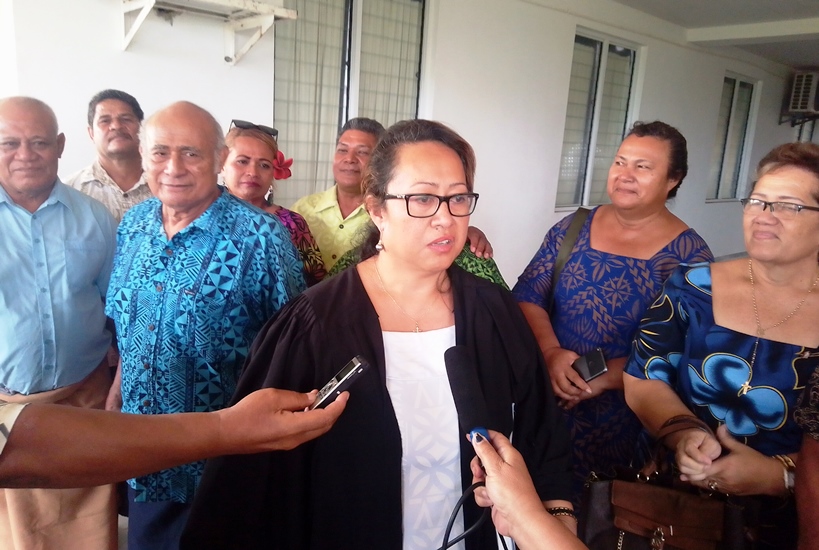Community
Supreme Court interim injunction avoids mass eviction of Leauva’a families

By Lagi Keresoma/
Apia, SAMOA – 09 April 2024 – His Honour the Chief Justice, Satiu Simativa Perese has granted an interim injunction against an eviction order that could have resulted in the mass removal of families from Leauvaa village this month.
The order was to take effect from 05 April 2024 in the continuing land dispute between Afega and Leauva’a villages.
In his 23 page decision delivered in full in English and part in Samoan, Perese said the application was “an eleventh hour attempt to seek and interim inunction to stay the planned eviction.”
The Applicants were some 18 Leauva’a families represented by lawyer Sala Josephine Stowers and they cling on to a 2017 decision of the Land & Titles Court of Appeal which whilst determining ownership in Afega’s favour, set aside a 2013 eviction order.
The Applicants say that this meant the Respondents (Afega) owned the land but were not able to evict the Applicants.
The essence of the application concerns the validity of the 2018 LTC decision which purports to override the 2017 decision of the LTC Appeal Court, making a new eviction order against the Applicants.
The application sought a judicial review of three LTC decisions – the 2018 decision, and two made in 2023. But given the new legal landscape in Samoa since the 2020 Constitutional amendments that set up a new court system, presents legal issues as to the jurisdiction of the Supreme Court to hear and rule on the application.
The Applicants Motion alleged that the three decisions challenged, involve jurisdictional error and they should be quashed.
The Applicants plead that these decisions deprive them of fundamental rights which are protected under Part 11 of the Constitution: namely, Articles 6, 9, 13(d) and 15.
Counsel for the LTC, Letoafaiga DJ Fong argued that under the new legal and court system set up, the Supreme Court has no jurisdiction to hear the applicants’ substantive application and would therefore not have the jurisdiction to make and interim order.
Chief Justice Perese ruled that “The Supreme Court is a court of general jurisdiction and it has an inherent jurisdiction and inherent powers, which are based in the common law, to the extent that the jurisdiction or powers are not excluded by an Act of Parliament.”

Some of the matais of Leauva’a village holding hands in thanksgiving prayer after the decision in their favour was delivered yesterday afternoon.
The land dispute between Afega and Leauva’a
This dispute between Leauva’a and Afega over land first came to the Land and Titles Court in 1952 that ruled the disputed land is located behind the border of the 723 acres the Government gave for the use of the people of Leauva’a. This land is not owned by Leauvaa but by Fata and Maulolo (of Afega) who continue to hold the pule or ownership of the land.
The court went on to prohibit the establishment of new plantations and that the people of Leauvaa were required to vacate the land by 31 December 1959.
The scope of the 1952 decision was the subject of further proceedings heard on 5 April 1961 that was asked to determine whether the 1952 decision applied to land that was not being used by the people of Leauvaa at the time of the 1952 decision. The 1961 Court recognised that the 1952 decision did not particularize which areas were affected by the ruling and determined that Fata and Maulolo could determine the scope of the areas affected by the decision. The 1961 Court extended the date for the Leauvaa people to vacate to 1 January 1962.
In 2013, the Court once again affirmed Fata and Maulolo’s pule over the land, consistent with the findings of the LTC in 1952, 1962 and 1971. Its decision dated 14 June 2013 directed that the people of Leauvaa were to vacate the land behind the boundary of the 723 acres given to Leauvaa within 6 months but no later than 31 December 2013.
The Appeal Court decision sets aside eviction order
The 2013 decision was appealed to the LTC Appeal Court which under the LTA 1981 was an appeal against a final decision of the LTC under Part IX of that Act. The Appeal Court headed by Vaepule Vaemoa Vaai as its President confirmed that Fata and Maulolo held the pule over the land.
However, it held that the 1952 determination only applied to those from Leauvaa who were using the disputed land before 29 July 1952, the date of the 1952 decision. It accordingly upheld the appeal against the eviction order made by the 2013 court and the order for the eviction was set aside.
In his decision, Chief Justice Perese said that the Appeal Courts ruling on eviction, was disregarded by the LTC which issued a further decision on a proceeding between the same parties, arguing the same issues, filed and determined in 2018.
“The 2018 decision is simply a no no in our legal system,” said Perese. “Our legal system is based on the rule of law and means that a decision of a superior court such as and Appeal Court binds all lower courts such as LTC. Unless the Appeal Court can be distinguished on the facts of law, it is binding on the lower court.”
Late Chief Justice Directive
Perese also cited the late Chief Justice, Patu Tiava’asu’e Maka Falefatu Sapolu’s directive to Sala Lauano, the first named applicant to file a petition against that entered by two Afega matais as the Court of Appeal has already ruled on the matter.
Patu also stated that the Court of Appeal’s decision is binding.
“Maybe the people of Leauva’a did not receive the letter of directive,” said Chief Justice Perese.
His Honour also pointed out that he has not seen any evidence from Afega that the eviction order should be implemented now just over a week on from Easter, and after over 50 years of peaceful and consensual coexistence between the two parties.
Afega claimed that they reacted because Leauvaa had laid claim on the lands.
Whilst his Honour does not question the claim by Afega, he however questions why the eviction order should be implemented now before a superior court had had the chance to look at the legality of the 2018 decision.
His Honour then spoke in Samoan to explain the basis of his decision to ensure that peace prevails until a Judiciary review sits and deliberates on where the law challenged in this case.
Nine people of Leauvaa presented affidavits that speak of the impact of the destruction of their properties and plantations using heavy machinery, machetes and other tools.
Chief Justice Perese pointed out that “the circumstances of this case involve two large villages, with hundreds of people, families and parts of the communities who are to be evicted from land where they have lived and thrived for their sustenance and incomes for some 50 years upon the basis of a decision that appears to be contrary to law. It is the legal authority of the eviction that is being challenged.
“The LTC Legal system headed by the LTCAR cannot now or in the foreseeable future hear their application for leave to appeal the eviction decision or the appeal itself. It is difficult to conceive a more desperate situation.
“Having applied the principles to determine the question of whether an interim injunction should be granted, the three factors – a serious issue to be tried, the balance of convenience and the overall interest of justice, lead me to the conclusion that an interim injunction should be granted,” said Chief Justice Perese.
Outside court, Sala Josephine Stowers, who represented Leauvaa was emotional as she spoke to the media.
She said it had been a long struggle but she is grateful for the ruling and the faith, support and patience of her clients.
CLICK FOR FULL DECISION: Afega & Leauvaa Decision 09 April 2024





















